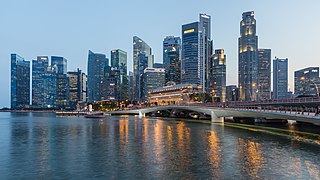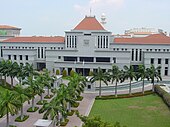
The economy of Singapore is a highly developed free-market economy. Singapore's economy has been ranked as the most open in the world, 3rd least corrupt, most pro-business, with low tax rates and has the third highest per-capita GDP in the world in terms of purchasing power parity (PPP). APEC is headquartered in Singapore.

Lee Hsien Loong is a Singaporean politician who has served as the Prime Minister of Singapore and leader and secretary-general of the People's Action Party (PAP) since 2004. Lee led the party to victory in the 2006, 2011, 2015 and 2020 general elections, with his current term beginning on 27 July 2020. He is expected to step down as prime minister before the next general election and be succeeded by Deputy Prime Minister Heng Swee Keat.

The Central Provident Fund Board, usually known as either CPF Board or simply the Central Provident Fund is a compulsory comprehensive savings and pension plan for working Singaporeans and permanent residents primarily to fund their retirement, healthcare, and housing needs in Singapore. The CPF is an employment-based savings scheme with the help of employers and employees contributing a mandated amount to the fund for their benefits.

A Non-constituency Member of Parliament (NCMP) is a member of a Singaporean opposition political party who, according to the Constitution and Parliamentary Elections Act, is declared to have been elected a Member of the Parliament of Singapore without constituency representation, despite having lost in a general election, by virtue of having been one of the best-performing losers. The number of NCMPs is 12 less the number of opposition Members of Parliament ("MPs") elected. NCMPs enjoy all of the privileges of ordinary Members of Parliament.

Sylvia Lim Swee Lian is a Singaporean politician, criminal lawyer and academic serving as an elected Member of Parliament (MP) representing the Aljunied Group Representation Constituency for the division of Serangoon from 7 May 2011 to 22 June 2020, and for the division of Paya Lebar since 10 July 2020. She is the first female opposition Member of Parliament since 2011.She was a Non-constituency Member of Parliament of the 11th Parliament of Singapore from 11 May 2006 to 18 April 2011.

The Ministry of Education is a ministry of the Government of Singapore that directs the formulation and implementation of policies related to Education in Singapore. It is currently headed by Minister Lawrence Wong who oversees education from Primary 1 to tertiary institutions.

Human rights in Singapore are codified in the Constitution of Singapore, which complies the legal rights of its citizens. These rights are protected by the Constitution and include amendments and referendums. These rights have evolved significantly from the days since independence though the government in Singapore has broad powers to possibly limit citizens' rights or to inhibit political opposition. In 2018, Singapore was ranked 151st by Reporters Without Borders in the Worldwide Press Freedom Index. U.S.-based Freedom in the World scored Singapore 3 out of 7 for "political freedom", and 3 out of 7 for "civil liberties", with an overall ranking of "partly free" for the year 2015.
Immigration to Singapore is historically the main impetus for population growth in the country since the founding of modern Singapore in the early 19th century. Immigration and immigrant workers in Singapore have been closely associated with Singapore's economic development. For a long period after its founding, the majority of Singapore's population were immigrants. It was not until around the 1930s that the number of native births in Singapore would overtake net immigration. After its expulsion from Malaysia in 1965, immigration laws were modified in 1966 to reinforce Singapore's identity as a sovereign state. However, the initial strict controls on immigrant workers were relaxed as demand for labour grew with increased industrialisation. Immigration would again become the largest contributor to population increase in Singapore in the late 20th century and early 21st century.
Internet censorship in Singapore is carried out by the Media Development Authority (MDA). Internet services provided by the three major Internet service providers (ISPs) are subject to regulation by the MDA, which requires blocking of a symbolic number of websites containing "mass impact objectionable" material, including Playboy, YouPorn and Ashley Madison. The civil service, tertiary institutions and Institute of Technical Education has its own jurisdiction to block websites displaying pornography, information about drugs and online piracy.

Healthcare in Singapore is supervised by the Ministry of Health of the Singapore Government. It largely consists of a government-run universal healthcare system with a significant private healthcare sector. In addition, financing of healthcare costs is done through a mixture of direct government subsidies, compulsory savings, national healthcare insurance, and cost sharing.
Lease Buyback Scheme (LBS) is a monetisation option introduced by Singapore. It was announced by Singapore’s Minister for National Development, Mah Bow Tan, in Parliament on 6 Feb 2009, and the Housing and Development Board (HDB) has started accepting applications for LBS from 1 Mar 2009. The scheme underwent a review, following Singapore's Deputy Prime Minister and Minister for Finance and Manpower, Mr Tharman Shanmugaratnam announcement on 17 Feb 2012. The enhanced LBS was announced on 27 December 2012, under which, eligible elderly households will receive a $20,000 LBS bonus when they sell the tail-end lease of their 4-room or smaller flats to HDB and use their net proceeds to top up their CPF Retirement Account (RAs) to the specified top-up requirements. Further revisions to the scheme were announced on 3 Sep 2014, and took effect from 1 April 2015.

Kasiviswanathan Shanmugam, better known as K. Shanmugam, is a Singaporean politician and former lawyer. A member of the governing People's Action Party (PAP), he has been the Minister for Law since May 2008 and the Minister for Home Affairs since October 2015, a post which he had briefly served from November 2010 to May 2011. He previously served as the Minister for Foreign Affairs from May 2011 to September 2015. He has been a Member of Parliament (MP) since 1988 representing the Sembawang Group Representation Constituency (1988-2011) and the Nee Soon Group Representation Constituency, serving the Chong Pang ward in both constituencies.

Halimah binti Yacob is a Singaporean politician serving as President of Singapore since 2017. Previously a member of the governing People's Action Party (PAP), she was a Member of Parliament (MP) for Jurong GRC from 2001 to 2015 and for Marsiling–Yew Tee GRC (Marsiling) from 2015 to 2017. She was the 9th Speaker of the Parliament of Singapore from 2013 to 2017, which she resigned to participate in the 2017 Singapore presidential election. Halimah won in an uncontested election, as no other presidential candidate was issued the Certificate of Eligibility. She was sworn in the following day becoming the first female president in the country's history and the second Muslim since Yusof Ishak in 1965.

Adrian Tan Cheng Bock is a Singaporean politician and medical doctor who is the founder and first Secretary-General of the Progress Singapore Party (PSP). He also stood for the 2011 presidential election and won the second highest number of votes at 34.85% among all four candidates, losing marginally by 0.35% to the winner Tony Tan.
Foo Mee Har is a Malaysian-born Singaporean politician. She is a Member of Parliament (MP) for West Coast GRC. She is the Chairman of the Estimates Committee of Singapore Parliament. She is also a member of the Government Parliamentary Committees of both: 1) Finance and Trade & Industry; and 2) Education.

The Singaporean presidential election of 2017 was the fifth Singaporean presidential election after President Tony Tan's term ended on 31 August. Following amendments to the Constitution of Singapore, the election was the first to be reserved for a particular racial group under a hiatus-triggered model. The 2017 election was reserved for candidates from the minority Malay community, who had not held the presidential office since 1970.
In Singapore, the Pioneer Generation Package is a S$9 billion package launched in 2014 aimed at helping pioneering Singaporeans to meet retirement adequacy. PGP is designed as a series of healthcare and social support schemes to show gratitude towards pioneer Singaporeans for their contributions to Singapore during the nation's nascency. The package covers approximately 450,000 pioneer Singaporeans over an estimated 20-year period.

Anthea Indira Ong Lay Theng is a former Nominated Member of Parliament (NMP) for the 13th Parliament of Singapore. Ong is also a full-time entrepreneur and social advocate, being the founder of social organisations including Hush TeaBar and A Good Space.
The following lists events that happened during 2020 in the Republic of Singapore.

The COVID-19 pandemic in Singapore is part of the worldwide pandemic of coronavirus disease 2019 caused by severe acute respiratory syndrome coronavirus 2. The first case in Singapore was confirmed on 23 January. Early cases were primarily imported until local transmission began to develop in February and March. By late-March and April, COVID-19 clusters were detected at multiple dormitories for foreign workers, which soon contributed to an overwhelming proportion of new cases in the country. Singapore currently has the third highest number of confirmed COVID-19 cases in Southeast Asia, behind Indonesia and the Philippines.













